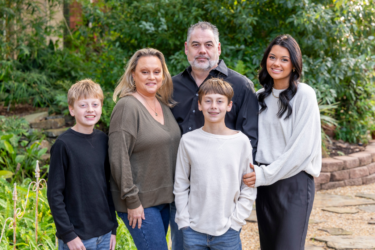Often, one of the most neglected parenting lessons throughout a marriage is, in fact, the marriage itself. As couples become increasingly hyper-focused on schedules and extracurricular activities (travel ball, dance, cheer, festivals, events, etc.), they often discount the very thing that brought the family into existence itself–the marriage.
In couples counseling, I sometimes ask a new couple what grade they achieved in their high school marriage course. It’s largely a rhetorical question and potentially a lame marriage counseling joke, but it does provide some perspective into how we have learned to engage in relationships. Our knowledge of how to maintain the most challenging and intense relationship of our lives was not a subject we could excel in during school, but rather a combination of observations of marriages closest to us as we grew, which in most cases was our parents’ relationship. And in your child’s life, that includes your own marriage today.
Your Home is a Classroom
Whether you realize it or not, your parents’ marriage relationship, or lack thereof, has had a tremendous impact on the relationships you have with others today, especially your spouse. The truth is that your home is a classroom for your children to learn about the various complexities of life, human emotion, love, and relational dynamics. In this classroom, your marriage is the teacher. Like it or not, it is the driving force that guides your children’s understanding of love and relationships. I think most people have some baggage, good or bad, from watching their parents’ relationships, and it is sometimes an unsettling thought that we, as human beings, tend to mimic the behaviors we observe in others. For better or for worse, in sickness and in health, your marriage is being observed. The good news is, this can be a natural, wonderful way to teach your children how to disagree, how to love, and how to support the ones you love the most.
The Walls Have Ears
When I ask clients to describe their parents’ relationship, they often end up describing how their parents “fought” or disagreed with each other. It would be naïve to think that your children don’t pick up on your tone toward your spouse or the subtle criticisms you may make toward each other. Children are curious creatures, and they are constantly learning from their environment, their interactions with others, and by watching others interact.
As a child, I remember knowing where in the house I needed to be in order to listen in on a conversation in any given room. If my parents were in an argument, this was something that piqued my curiosity, even though I knew that I wasn’t supposed to be listening in. So, it should come as no surprise that your kids are always listening, and they are good at it. It doesn’t matter if the TV is on while they are playing on their tablet and their brother is practicing drums in the next room–they are listening. They hear what you say and pay careful attention to how you say it. And they are unknowingly gauging safety, internalizing how to speak to those they love, and how to handle conflict.
So, when you have an inevitable disagreement, tiff, discussion, argument, fight, or whatever you want to call it with your spouse, be mindful of your environment and the little ears that could be listening. Knowing this, you can model to your children how to find common ground even though there seems to be two completely opposing views. You can show them how to respect the views of another while also sharing their own point of view. You can show them the power of humility and how to healthily put someone else’s feelings and viewpoints ahead of their own for the common good of the family and the relationship.
Through 10 years of marriage and two children, my wife and I have found that disagreements are an inevitable part of any relationship. But it’s how you handle them that strengthens the relationship and teaches your children how to approach conflict. Often times, through our disagreements, we show our children what it means to love.
Modeling Love
I think one of the most challenging aspects of life is to truly love someone else. It can be a scary and risky endeavor to selflessly love someone and allow them to love you. We all know love is more than an emotion or feeling. It is also a way of relating to someone else. Through our marriage, our kids will be able to learn about what truly loving someone looks like.
Who else is in a better position to teach your kids how to love in a relationship? I certainly hope it is not the CW or Freeform. Fortunately, your marriage holds more weight in your kids’ minds than the twisted model of love they see in the media. They notice when you put your spouse’s needs ahead of your own. They pick up on how to securely and lovingly engage in disagreements without fear that the relationship is in jeopardy. They learn how to talk about what really matters and to care for someone’s feelings and to hear someone’s heart. They understand what it looks like to put a spouse first, even when it is hard, because they have seen it modeled for them time and time again.
By watching your marriage, your children will learn that loving someone is an active thing. Your marriage can instill in them that love is a choice, not something that just happens. It’s not enough for you to just show love to your kids because this is often very one directional. You have to show them what it looks like to have two people healthily love, care for, and support each other in a marriage dynamic as well.
Putting it into Practice
As you attempt to actively love your spouse in your marriage, you can also bring your children into this process. I remember the first time my oldest son brought my wife a flower from the backyard. I told him, “Mom had a hard day today, and I think a flower would really cheer her up. Do you want to bring her one?” My son’s eyes lit up like he just discovered a secret. He picked her a flower and was thrilled with her reaction. That day, he learned that he had the power to “make mom happy.” Essentially, he was beginning to understand that he had the power to affect someone’s emotions in a positive way. Sure, he’s watched me bring flowers home before, but this was different. I let him experience what it was like to show love to someone in a tangible way. He saw that a simple flower from the garden made his mom feel appreciated. When you do things for your spouse, your kids will remember. When you say things about your spouse, they will remember. They will eat up any insights you give them into your relationship.
As parents, we constantly help guide our children in their emotions, actions, and development. Let’s not forget to use our marriages as an important tool to help shape our children’s idea of love, communication, safety, and value. ■





